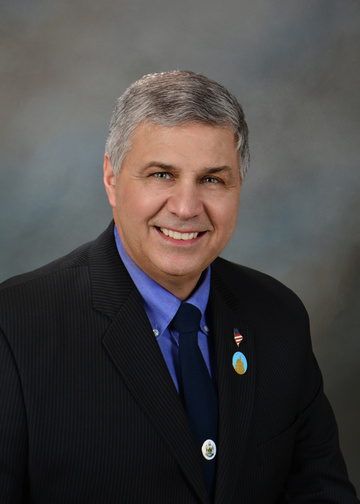A Democrat who works as an attorney and has spent much of his adult life in public service and a Republican senator who was a deputy sheriff for decades are vying for the District 16 Maine Senate seat with the promise to support local businesses and address the drug epidemic.
Rep. Henry Beck, D-Waterville, faces Sen. Scott W. Cyrway, R-Benton, in the campaign to represent Albion, Benton, Clinton, Unity Township, Waterville, Winslow and Fairfield.
Beck, 30, is serving his fourth term in the Maine House of Representatives and works as an attorney at Jabar LaLiberty and Dubord, LLC. in Waterville. He said he’s running for the Senate because he thinks he would be a more effective leader and will be able to stand up to his own party.
“We needs leaders in Augusta who will solve problems and treat others with respect,” Beck said, “and that leadership is lacking.”
Cyrway, 61, was first elected to the Senate in 2014. He is currently on a leave of absence as deputy sheriff at the Kennebec County Sheriff’s Office after working there for 29 years. He decided to run for the Senate seat two years ago after a former D.A.R.E. student asked him to.
“It wasn’t because of any political aspirations or party,” Cyrway said.
Both candidates say they want to help the economy and support local businesses.
Beck’s family started CO Beck Roofing in Waterville 100 years ago, which is why he sponsors bipartisan laws that help small businesses, he said. Maine has to support the employers it already has, Beck said, while also supporting new industries, such as renewable energy, that can create jobs.
Beck also wants to take a “serious look” at the state’s community college system, which has the ability to help people gain the skills they need to get good jobs, he said. The state has to make sure those colleges have enough resources to attract students, he said.
Beck also said he’s not afraid to stand up against his own party for what he believes is right. For example, he broke with party leadership to support a bill that required applicants to search for jobs before receiving certain welfare benefits. He also sponsored a bill to provide one-time funds to Kennebec Valley Community College to preserve its allied health programs, which most Democrats voted down.
“It takes commitment and an ability to understand the issues to be in the state Senate,” Beck said.
Cyrway said the bills he sponsors generally receive bipartisan support, such as a bill to create a Blue Alert program that passed 34-0-1. The Blue Alert program is a statewide alert program used when a law enforcement officer is killed, injured or missing.
Cyrway was also part of the group of Republican lawmakers who tried to get a competing question on the ballot that would enact a $10 minimum wage by 2020, as opposed to the current proposal of $12. He thinks the minimum wage should be increased but believes Question 4 on November’s referendum is “too much, too quick.”
“I think you’re going to find we lose more jobs than what we gain out of it,” he said.
While the two agree that something needs to be done to solve what some call a growing heroin epidemic within the state, they have different ideas about what direction to go in search of a solution.
Beck said he thinks Maine has to change its approach and accept federal funds for health insurance so more Mainers can afford treatment such as counseling.
“We can build 500 new prisons and it won’t change the fact that we have a public health crisis,” Beck said.
Beck sponsored a bill to expand access to opioid overdose medication naloxone hydrochloride, or brand name Narcan, which can save the life of someone who has overdosed on an opioid drug. The law allows doctors to prescribe naloxone to not only immediate family members, but also friends or someone in a position to help a person who is at risk of overdosing.
Beck also supported a bill to create a Naloxone Bulk Purchase Fund that would allow the Office of the Maine Attorney General to buy and distribute naloxone to municipalities throughout the state, which would give the medication to first responders, police and firefighters.
Cyrway, however, sees prevention as key to solving the problem. He was one of five senators who voted no on the bill to create a naloxone fund, which was later vetoed by Gov. Paul LePage and then overridden by a two-thirds vote of the House of Representatives.
“The problem with that bill is … when a person is using a drug, you don’t know what their medical condition is,” Cyrway said, explaining why he opposed the bill. “When you do give that shot, that person doesn’t want you to call the police. These drugs are very harsh and all they want is the next fix.”
Cyrway opposes letting nonmedical personnel administer the shot for a number of reasons, including the fact that the average person may not know how or where to give the shot and that young people could end up with this responsibility, which could traumatize them. Cyrway also thinks the medication could enable drug users, he said.
While Cyrway said treatment is important, and he supports medical professionals having access to drugs such as Narcan, he said he thinks more emphasis should be given to prevention. He’s worked as a D.A.R.E. officer for 25 years and is the D.A.R.E. training coordinator for Maine.
“We need prevention more than we do treatment,” he said.
The loss of prevention education in schools and funding for those programs is part of why the state is seeing a “climax” of drug abuse, he said. Cyrway sponsored a bill that would use money from forfeited firearms to fund educational programs in schools about substance abuse, which did not pass.
Madeline St. Amour — 861-9239
mstamour@centralmaine.com
Twitter: @madelinestamour
Copy the Story LinkSend questions/comments to the editors.





Success. Please wait for the page to reload. If the page does not reload within 5 seconds, please refresh the page.
Enter your email and password to access comments.
Hi, to comment on stories you must . This profile is in addition to your subscription and website login.
Already have a commenting profile? .
Invalid username/password.
Please check your email to confirm and complete your registration.
Only subscribers are eligible to post comments. Please subscribe or login first for digital access. Here’s why.
Use the form below to reset your password. When you've submitted your account email, we will send an email with a reset code.